| |
"So I had to be careful. I recognised the responsibility that, whether I liked it or not, I had to accept whatever the obligation was. That was to behave in a manner, to carry myself in such a professional way, as if there ever is a reflection, it's a positive one." |
| |
Sir Sidney Poitier with the weight of 18 million
black Americans on his one pair of shoulders |
| |
"It was a terribly unfair responsibility for him... he was carrying this alone and it was not a burden that he welcomed." |
| |
Actress Lee Grant quoted in 'Scenes From A Revolution' by Mark Harris |
In a mere six months from the latter end of 1966 to 1967, Sidney Poitier made three films that in their respective genres could all be considered bona fide cinematic classics. I'm not sure any other filmmaker or actor could claim such a feat. By the mundane - but in the 60s, explosive - aspect of his skin colour, each movie peered closely at race relations in varying degrees focussing on the lone black man in a mostly white culture. I've previously reviewed the DVD of one of these three, the superb In The Heat Of The Night. As for Guess Who's Coming To Dinner and To Sir, With Love, well, you've come to the right place. Indicator's packed Blu-rays were released last year and well worth checking out. Please head down to the next main title for the reviews. To understand my own feelings on race for context, feel free to carry on from here...
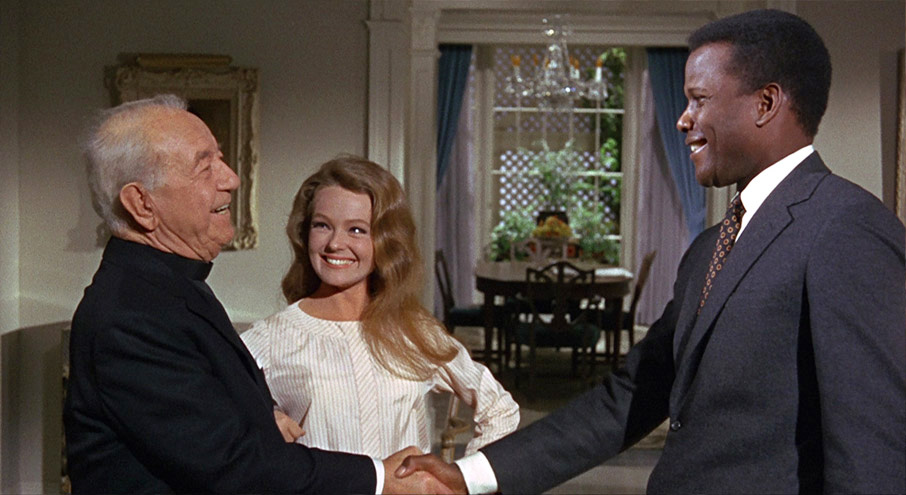
Racism? I'm not a fan (that's the nutshell). I was born in the 60s and grew up in the 70s. Xenophobia and specifically racism was endemic, ordinary almost – as horrifying as that sounds - but certainly rife. It was institutionalised, rubber-stamped and enforced in some cases around the world, by law. Allow me a personal digression. I have already alluded to this memory (in my review of In The Heat of the Night). When I had a stay in hospital to have my tonsils removed, the child in the bed next to me was called Derek. He loved the Gerry Anderson puppet TV show Stingray as much as I did and we talked about it a lot and swapped comics and annuals. What united Derek and I was almost everything except skin colour. He was blind to my whiteness and I was blind to his brownness. Two kids with a common enthusiasm; how much purer can a bond be? To paraphrase Ms. Turner, "What's colour got to do with it?" Well, in the 60s and 70s, the answer to that question was "Quite a considerable bit." If ITV decided to re-run its once absurdly popular sit-com Love Thy Neighbour today, my son would be mortified. He would not be able to believe that people thought and acted in that way toward people who did not share their own skin colour. A relative of mine once visited me in hospital and asked me if I wanted to be moved to another ward. What? Moved away from the indignity inflicted upon my white soul by my neighbouring Stingray fan? Jesus. This relative crossed the road (with me in tow) so she wouldn't have to walk past a black boy and his white adoptive mother. But this was 'normal' at the time. In so many ways, despite the horrors of 2016 and their promise for what's to come in 2017, the human being has socially evolved. Long way to go yet, but some parts of the world have proved capable of anchoring racism firmly in the past or at least that's what the societies tell themselves. I have faith in my son's generation, in my experience, one as colour blind as any generation can be.
White was my childhood, or at least 99.8 per cent. The 0.2 were two extraordinary boys; the first was the only African descent black boy in school. His surname (hand on heart) was 'Black'. That had to be a given name to an unwanted child. I got to know him and was in awe that he took his colour and the potential of his mistreatment and used it as a force against idiots that believed skin colour was a way to determine superiority. In short Anthony Black (bless you, Sir) was the hardest kid in school and took absolutely zero shit from anyone. My family knew his adoptive mother so we had a connection but I was never taught to fear and hate people who were different to me despite elements in my own clan being as tribal and insular as a Trump rally. The second boy was (and still is, as far as I am aware) Sri Lankan. He taught me photography, constructed his own home made Hi Fi kit, painted like a real artist, introduced me to the sheer joy of Earth, Wind and Fire, and honoured me by making me Best Man at his wedding. If geography wasn't so capriciously cruel, I'm sure we'd be sharing drinks and memories now but I hardly see him anymore. That is a significant loss to me but as I said, geography is merciless and Facebook is no substitute for a real relationship.
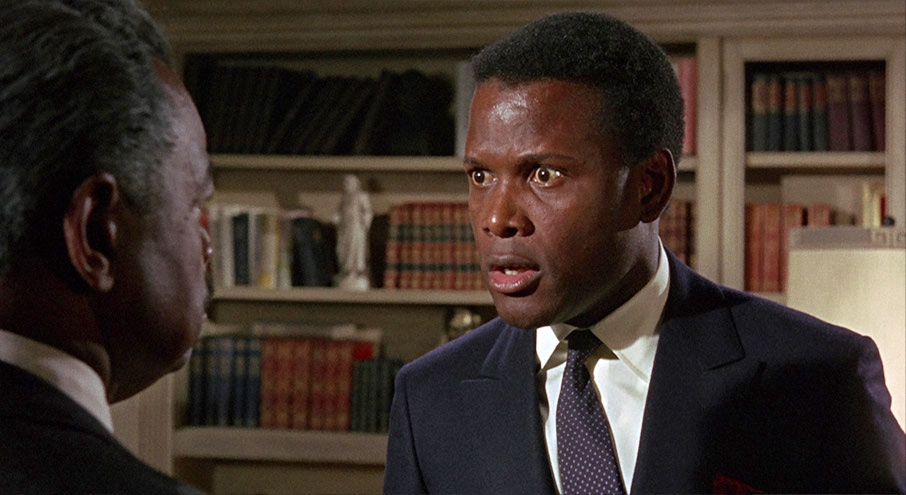
The two stark, and sticky memories that stand out from my childhood were the following; my mother forcefully reminding me that male dancers were not necessarily 'poofs', effeminate and girlish. My mother was insistent that dancers were extraordinarily disciplined, athletes almost. 'Poof' was of course the 'gay' insult of its day and dancing was seen as a feminine pursuit. This is why Billy Eliot took such stick. The other memory was that in movies, the only black man who made a dent in the overtly racist society I grew up in was Sidney Poitier. I'm certain Mr. Poitier hadn't started acting to fulfil this role but happenstance and fate pushed him forward as a vanguard changing people's perceptions about what colour really represented, just another hue in human. In America, it was more significant for Poitier to be a popular movie star. There's a lot of history in that country's short life that's peppered with horror at the brutality of the slave trade.
Let's process a few Hollywood truths. Poitier was (and still is at 89) an objectively handsome man regardless of colour judgement. And people like their movie stars to be good looking. As a presence on screen he was commanding, charismatic and quite apart from winning a Best Actor Oscar for Lilies of the Field (a first for a black man in a competitive category), he was the biggest Hollywood star in 1967. Let that sink in. He chose his roles carefully and critics of his judgement felt the characters he played weren't flawed or as edgy or as sexual as every one else (being white) was 'allowed' to play. But the man was hyperaware of the significance of his fame and treated it and those with whom he lived and worked with the same respect. He's been knighted by the Queen and received the Presidential Medal of Freedom in 2009, two honours that underline his importance to the societies and world he helped change. But in some ways, the bigger picture is the work. I contend that Virgil Tibbs from In The Heat Of The Night was flawed despite his talents as a detective. He had human failings just as profound as those around him. The other two films that cemented his reputation as a huge movie star were Guess Who's Coming To Dinner and To Sir, With Love, both showcasing his strengths as an actor. And both Blu-rays are stuffed to the gills with Extra Features. 1967 may have seen me running around at six years of age but for Poitier, with those three movies, it was a defining and exceptional year. Let's start with To Sir, With Love (with a rather nice coincidence that seven years later, Poitier was awarded the KBE by the Queen that made him a real 'Sir').
| Will Thackery make peace? |
| A Blu-ray Review of TO SIR, WITH LOVE |
|
| |
|
| |
"Whatever was in the film, happened, but by the time the film makers got through with it, it took on a different kind of patina....I had to remind James Clavell [the writer, director and producer] on more than one occasion that my book was autobiographical, not a novel. He said, 'I'll keep it in mind' - like hell!" |
| |
Author of the source autobiographical novel, E. R. Braithwaite |
I am a complete sucker for school movies. It seems to be a defined and distinct genre, a group of films that feature a bunch of young people, rebellious, ignorant and happily so, being buffeted and having their minds and worldview expanded by an older person with wisdom or sadism to impart. Depends on the movie of course. Even when this central aspect of the 'school genre' is not the movie's dramatic focus, I still love the teaching environment on screen. Unwin, Wittering and Zigo was a 70's movie with David Hemmings, the plot of which I barely remember but I still get a warm glow when I think of the film. If you recall one of the opening scenes of the Channel 4 hit Teachers... Rick Grimes (sorry, too much Walking Dead)... Andrew Lincoln has a first day as a teacher in front of his pupils that goes so well, we almost suspect it's wish fulfilment. It turns out that this is exactly the case. The relationship between teacher and pupils is often antagonistic but teachers know that for every raging sea of frustration, the buoys of satisfaction and hope are frequently scattered.
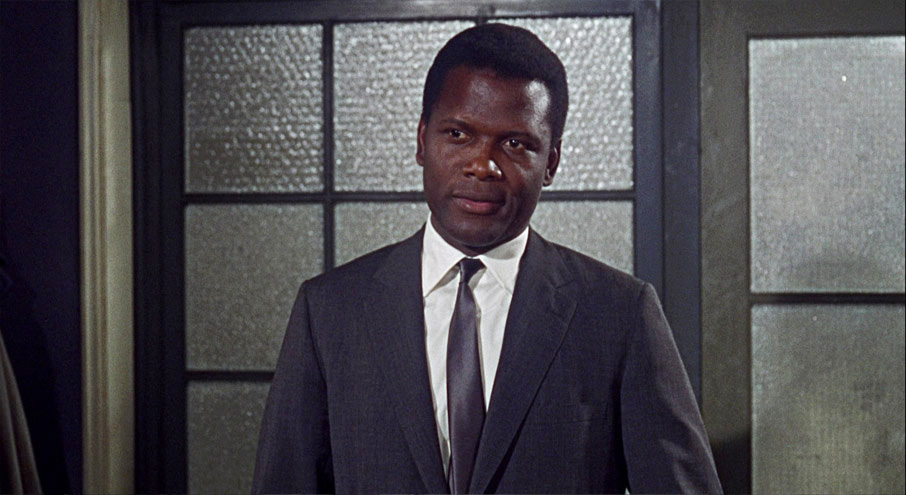
If Star Wars adopted the spoiler title style of To Sir, With Love (I mean where's the tension with a title like that?) it would have been titled Luke Blows Up The Death Star... So, we know exactly where we're going but another pertinent view is that we sort of know anyway. Poitier plays Mark Thackery, an unemployed engineer looking for work who takes on a teaching job in the interim in London's East End. Here are pupils who have been expelled from other schools and are generally regarded as un-teachable. First issue (completely irrelevant to one's enjoyment of the narrative but it has to be said); these kids are as anti-social, violent and rowdy as a class of sunflowers. The kids in Scum wouldn't make mincemeat out of them so much as steak tartare. Their victims would leave the room cold. I'm not saying that Poitier's charges are ineffective at baiting their teachers but I am saying that my classes in a British comprehensive school were significantly worse than this lot. Banging a desk lid is not a sign of rebellion and burning a used tampon just strikes me as faintly 'ugh' rather than anything else and that's the worst these kids get up to. The class is led by the head girl and boy (as in leaders not paragons of virtue promoted to a responsible status). Judy Geeson, a blonde beauty who popped up often in my youth on the small screen, plays Pamela Dare, a girl sure of her own physical charms but willing to learn that not all men will succumb. Christian Roberts plays Bert Denham, the leather-jacketed tough guy who is the new teacher's principal problem. If bluster were a secret weapon, he'd be in Bond's From Russia With Love's attaché case. Still in her teens is a bubble faced Lulu whose career really took off with her rendition of the theme song of the film. Lovely to see Adrienne Posta, another small but memorable part of my childhood.
Thackery is struck by the behaviour of the children, both positively and negatively and starts his own rigid teaching practically inviting the kids to push back at any opportunity, which of course they do. Lost in a career rut and utterly uninspired by his responsibilities as a fellow teacher is Theo Weston, played cynically by Geoffrey Bayldon who was soon to become Catweazle, certainly one of the most bizarre but well-loved children's TV characters ever broadcast. He's the source of the only real nods to Poitier's colour or attitudes towards it. A young Patricia Routledge (who found fame as Hyacinth Bucket in the 90's show Keeping Up Appearances) gives Poitier some needed advice. She has the extraordinary character name of Clinty Clintridge. Yeah, I know. It's not Goldfinger's Pussy Galore but someone somewhere is extracting the waste fluid (or is it just a simple nickname based on her surname?) Another member of the staff is the beautiful Suzy Kendall who is obviously forming a crush on her handsome new colleague. But then, seeing Poitier peel an orange with those perfect, long, tapered fingers, who wouldn't swoon?
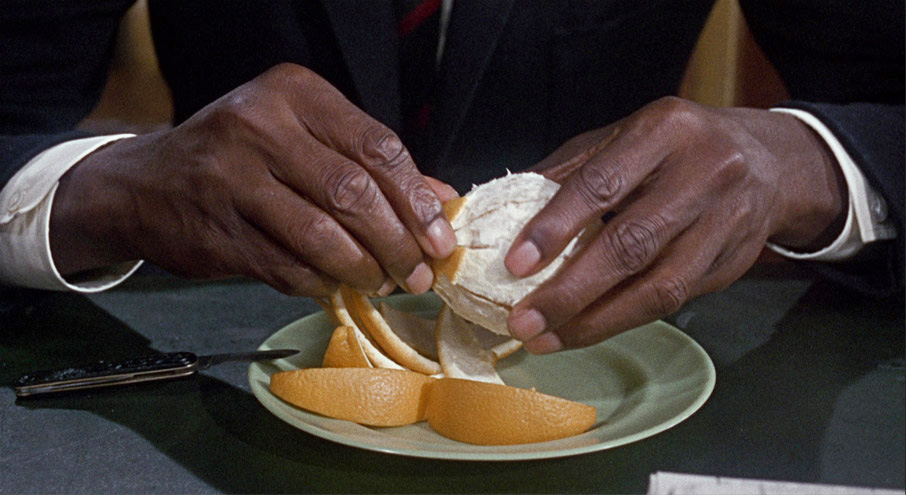
After the burnt tampon incident, Poitier loses his rag and makes a decision. Into the bin go the textbooks. From then on, he will treat them like adults and will teach them things they will need to learn to live in a civilised society. Like making a salad! Suddenly this kind of education is something the children realise they can value. Along the way there are hiccoughs and adult compromises are taught to keep the peace even though the class has to be humble to those in the wrong in the first place. As I mentioned, the title gives away the ending but for me, it's well earned and Poitier's shock and pre-teary delight at the recognition of his role in the children's lives is a small, subtle masterclass of the acting craft. To Sir, With Love was a huge hit making over sixty five times its production budget on its first theatrical run. The theme of the film was a No. 1 smash in the US and the UK. It's enormously entertaining, includes engaging performances and a first class turn from Poitier himself. It also has the oddest poster tag line for any film of its ilk... How about 'A story as fresh as the girls in their minis...' Christ! What does that actually mean? Can it be as sexual as it seems?
Finally, an aside but a fun one... Lulu gets to say the phrase "son of a bitch" but the audio is drowned out by a passing train. It set me wondering when this now ubiquitous phrase got its on screen premiere. Even a year later in 1968, Eli Wallach is not allowed to be heard saying the whole thing as he screams "Son of a b..." and Ennio Morricone's singular score takes up the 'itch' in musical form. The phrase debuted on TV apparently in 1973 in the long running TV show M*A*S*H. Hell, even in 1975, Roy Scheider's effort is drowned out by a gunshot and subsequent explosion. Surely I don't need to remind you of "Smile, you son of a b..." On a quest to find out, the Internet is perhaps the least helpful research tool (too many unverifiable opinions) so I'll just let that one go.
The 2K restoration presented in the 1.85:1 aspect ratio boasts punchy colour and reassuring film grain. There are a few dust spots and sparkle but they never detract. The contrast is an interesting topic in a movie with a black star amid a predominantly white cast. I know from experience that shooting darker skin is a subtle skill every cinematographer should master.* I directed a TV series in Africa and had to take slide shots for publicity. With the sun directly overhead and the subject's very dark pigment, the resulting slide with its inherently increased contrast delivered harsh black mattes of faces and no end of tinkering could reveal the detail I knew was there. That said, Poitier is very well served by DP Paul Beeson. There's a lovely story on this subject from around about the same era, possibly the same year, 1967. Nichelle Nichols (aka Lieutenant Uhura of Star Trek) was being lit on the bridge of the Enterprise. A light was being lowered but the DP (using DP and gaffer-speak for not enough light) kept on repeating the words "She's dark! She's dark!" After it became obvious to the crew that this was an awkward moment and after the DP had realised how inappropriate the word was, Nichols diffused the situation beautifully with the reply "But comely!"
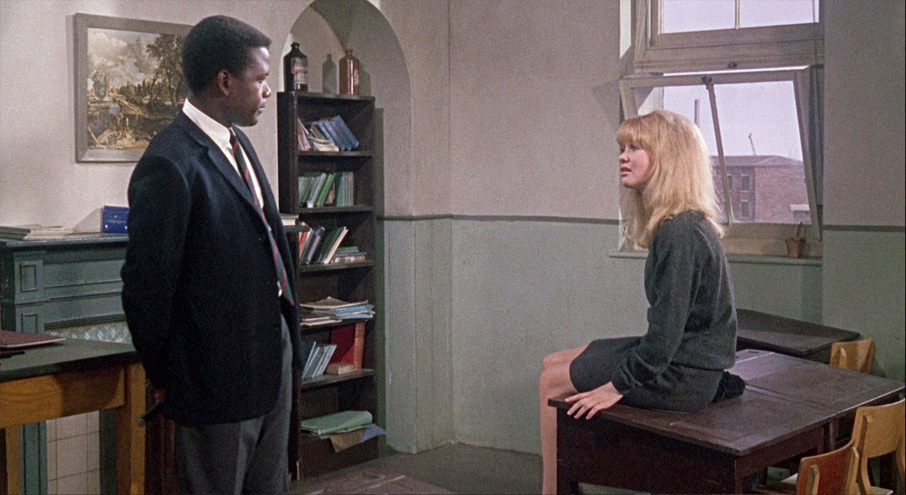
The original mono soundtrack is unfussy, largely hiss free and perfectly recorded for clarity's sake. There are new and improved (one assumes from the earlier DVD release) English subtitles for the deaf and hard-of-hearing.
Audio Commentary with Actress Judy Geeson, and Film Historians Nick Redman and Julie Kirgo
This is a charming, if somewhat deferential commentary between one of the movie's stars and two historians who find it quite the task to stay objective. Geeson is reveling in the attention and Kirgo stokes the fires of their inner young women (there are one or two throwaways about hair combing and make up). Geeson's recall is impressive and my favourite memory brought up is the answer to the question about how she reacted to the significance of Poitier, at that moment the most famous Hollywood actor, reluctant ambassador but fervent campaigner for black rights. Geeson remembers him sitting on orange boxes just being a fellow actor and in her naïveté and youth, just said "He was just Sidney," which to me ranks as one of the higher compliments you can give anyone. If you've read my In The Heat of the Night review, you may remember how sensual I found the examination of the corpse, mostly due to Poitier's physicality and the delicacy of his hands. Well, the subject comes up (over the orange being peeled in close up of course). He's described as 'balletic' a word I'd mouthed before it was uttered. Actors give good commentary because they tend to talk about related things rather than commentate on the action and Geeson is ably spurred on by Redman and Kirgo.
Audio Commentary with Author E.R. Braithwaite and Author/Teacher Salome Thomas El
The scene specific commentary is from educator Thomas El. Author Braithwaite's contribution is a little broader. Both are intercut and I suspect they're not in the same room (which means there is a mirror commentary out there somewhere with each man talking over each other's moments from the official version). Braithwaite reminds us of the state of education when it came to the troublesome children. He said they were... "waiting to die..." This is a fascinating insight into the original author's story and a perfectly judged lesson in how things can go south when dealing with teaching reluctant kids. Braithwaite said he was deeply grieved at seeing the movie for the first time (authors are at the mercy of the filmmakers and have no control over their story once they accept payment and sign a contract). Thomas El tells us that once he started getting through to his unruly mob, they displayed their respect by not trashing his car in the car park but trashing everyone else's. I don't know about you, but I'd be touched by that level of consideration. Braithwaite disabuses us of a few 'made up' moments in the film but then, movies need an ending and what the original author says did not happen also inspires others. I was reminded of the quote that says that artists lie to reveal the truth. Thomas El was offered a job at a significant higher salary and he turned it down because, "They are gonna know I left for the money..." which in some ways would disrespect the children and their needs. Braithwaite was offered a job at UNESCO (with ten times the salary he was getting, very persuasive). His reveries over the days he did Poitier's job conclude happily as does the movie, with the words "I think I learned to love them." Sweet. You learn a lot about teaching unruly children on this commentary track and it's well worth a listen.
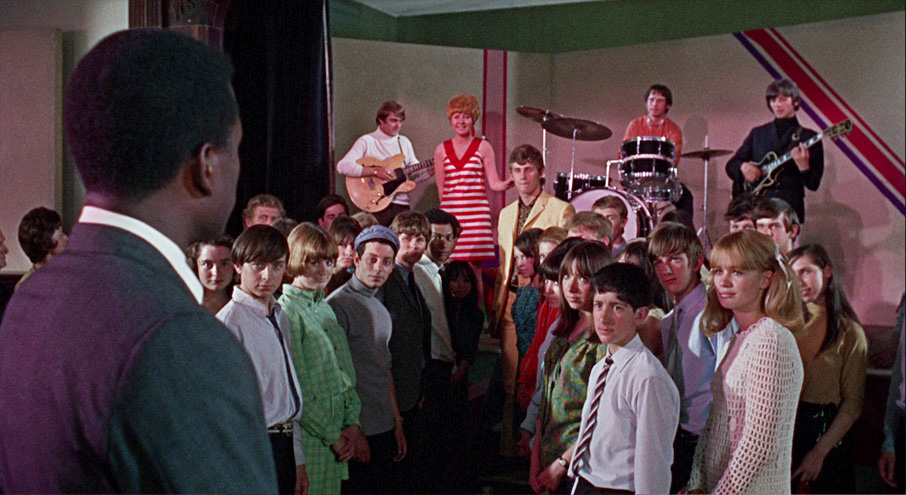
Isolated Score Track
For those who like isolated score tracks. I'll say no more.
Those Schoolboy Days: Christian Roberts on To Sir, With Love (23:32)
And he's still got the leather jacket! A one shot on the actor in interview with a few clips to illustrate his memories. For his first acting job, he gets to work with Poitier. Columbia puts him on a five-film contract and with his next role, he's playing opposite Bette Davis... Mr. Roberts must have done some wonderful things to get that lucky. He's a charming man and has nothing but praise for his cast and crew. What it must feel like watching yourself at twenty-one being fifty years older...
Look and Learn: Tony Woolward on To Sir, With Love (10:58)
Art Director on the film was Tony Woolward. His brief interview touches on his relationship with producer/director James Clavell and how his work on Georgy Girl got him the gig even though his superiors thought he may have been a bit young for the job. Talent and professionalism silences most naysayers.
E.R. Braithwaite: In His Own Words (23:43)
Reading from his own autobiography, Braithwaite tells some of the story that the movie fails to fully develop – the romance. He fell hard for a fellow teacher and in being introduced to her family, he went through what Poitier goes through in Guess Who's Coming To Dinner. Tragically, his love's father eventually drove the two apart, the idea of being a grandfather of mixed race children was too much for him (I think we say 'dual heritage' now). Wartime stock footage is bafflingly stretched to fill the 16x9 frame (why is this?) Braithwaite had a similar experience to Stephen King after the latter finished Carrie. Wracked (as all writers are) by self-criticism, King threw his manuscript in to the trash (he is American so trash is OK) and his wife fished it out and pronounced it good... A literary juggernaut was launched. Writing up notes after each day's teaching, Braithwaite compiled almost a teaching manual that when he had finished with it, took it out to burn. His landlady stopped him suggesting how many other people might benefit from the wisdom therein. So he turned it into a book...
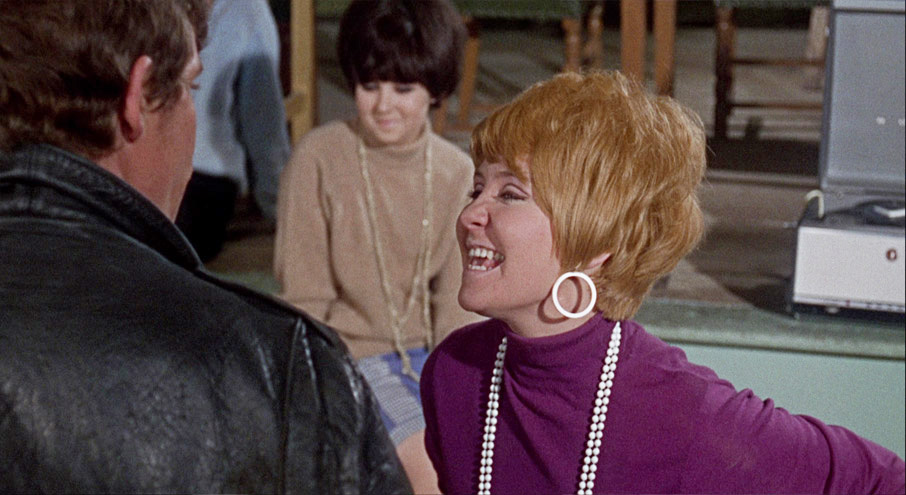
Lulu and the B-Side (5:02)
There is a slowly decaying picture in Lulu's cellar, there has to be. She was 62 when this interview was filmed if the © 2011 is to be believed. She looks half that. The adolescent, teenage pop star has morphed into an ageless 60s icon. She reminisces about how the UK ignored the theme tune (released on the B side of a 45rpm single) but that it, like Boney M's 'Brown Girl In The Ring', suddenly got a new surge in popularity once the American DJ's started playing it.
To Sidney with Love from Marty Baum (5:14)
Creative Artists Agency (CAA) agent Marty Baum tells of the budget raising from Columbia Pictures, the movie's preview screening and its success. It's so clear he holds Poitier (held, Baum died in 2010) in great regard. On the experience of the shoot, there was "...joy and happiness". I'm starting to get a theme here running through all aspects of this movie.
Principal El: He Chose to Stay (10:59)
Salome Thomas El (of the second commentary) is a principal and educator in the US and goes through the process of teaching children who do not want to be taught. With copious clips from the film, the talking head interview delivers passion and commitment. There's some overlap and repetition with the commentary but wisdom repeated cannot be a bad thing, can it?
Miniskirts, Blue Jeans and Pop Music (15:21)
Michael Des Barres (the boy with the sunglasses) takes us on a wild, 60s trip through the fashions and music of the period ably supported by Lulu. Des Barres is refreshingly candid and Lulu still looks amazing. The interview also employs the best way of censoring a swear word – just drop the volume with enough of the heard word so that those unoffended by the sound of the word 'fucking' (I beg your pardon) can figure out what was said. Poitier is worshipped by both interview subjects – seems right. Don't switch off at the first end credit, as the best two stories are told right after it.
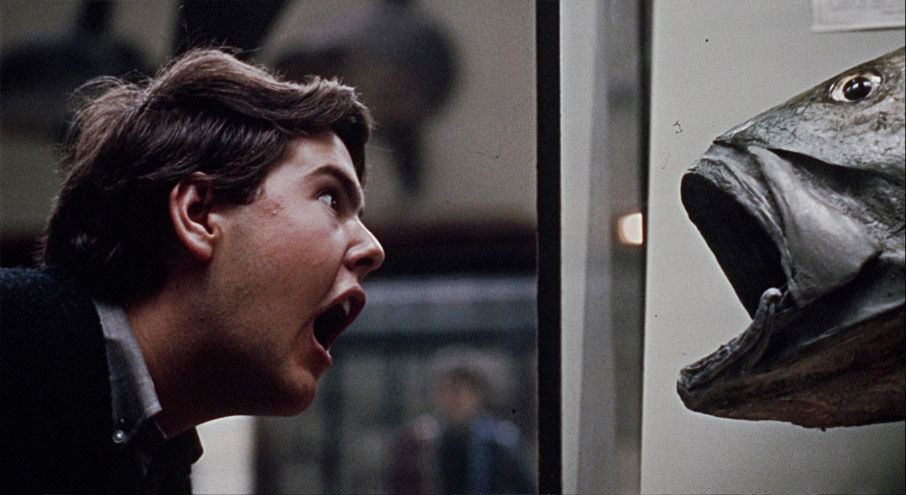
Original Theatrical Trailer (3:18)
A filthy (as in dust and scratches) 4x3 presentation, it's a great trailer of its era. I love the way it presents the rebellious students as the most difficult London has to offer. Ha! The words 'pussy' and 'cats' come to mind. It's still effective and as a snapshot of how movies were sold in the late sixties, it's a scream.
Image Gallery
30 colour pix (in various stages of disrepair) shown two per screen of the behind the scenes and some publicity shots. The poster designs are interesting but the graphic one does something I thought hitherto impossible. It makes Poitier look ugly. The children are also not looking their best, I have to say. In fact I don't recognise any of the children on the graphic poster. But the stills are fun to look through.
Booklet with new and archival contents
The handsome booklet has cast and credits and an excellent essay on the movie (Class Dismissed: Swinging London and Multicultural Britain in To Sir, With Love) by BFI Chair, activist and filmmaker, Tega Okiti. She was behind the BFI's recent black movie season, Black Star. There's a great deal of 60s background and she points out something you only really 'get' after three viewings. The film does represent the knocking of London's multicultural future on the classroom door. If you look, there is an Asian student and the only non-white student is part of a rather moving sub-plot. Also included is a series of quotes from the prominent critics of the late 60s (all of them negative) and printed in full, from the BFI's now defunct Monthly Film Bulletin, the review by Jan Dawson. With the exception of positive nods to Lulu and Christian Roberts, the review is overwhelmingly critical. There are some nice behind the scene pictures but did no one give the movie a good review at the time of its release?
A wonderful movie, if utterly predictable but its heart is in the right place and it's hugely entertaining if a tad on the 'light' side when it presents so called 'troubled' children. There are barely a few nods of implicit racism, something that surprised me and the film boasts a few heart-warming moments. The disc is packed with great extras so if you want to see one of the three classic Poitiers of 1967, here's where to start.
| Knock, knock, knocking on Hepburn's door |
| A Blu-ray Review of GUESS WHO'S COMING TO DINNER |
|
| |
|
| |
"If I am to be remembered for anything I have done in this profession, I would like it to be for the four films in which I directed Spencer Tracy." |
| |
Director, Stanley Kramer |
It's a time of turmoil in US politics; no, not now, in 1967. The Civil Rights Movement is gaining traction and slowly the country's staid and prosperous post-war fifties is dissolving into the tumultuous sixties. Some social norms are now being seen for what they objectively were, racist and grossly unfair. In this environment, the daughter of a liberal, wealthy couple, Joey, has fallen in love with a tall, dark stranger, John. He lost his wife and daughter in an accident and is a good deal older than Joey. The smitten couple 'make out' in the back of a taxi bearing them to Joey's parents. Meeting the parents is always laden with anxiety but this lovely young man is prepared for the reception he will inevitably get despite the purported 'liberality' of the older couple, Matt and Christina. John, of course, is black and shame on me for enjoying all the first contacts in the film. The look on people's faces when they realise that this is the man the young Joey is going to marry and vice versa as far as John's parents are concerned – priceless. There is a time constraint. The couple have a plane to catch that evening on their way to Europe and John needs Joey's father's blessing. To make matters more fraught, Joey has invited John's parents to dinner and John has not yet let it slip that his intended is white... So, this is the set up for the rather wonderful Guess Who's Coming To Dinner, a movie that prompted laws to be changed. Respect.
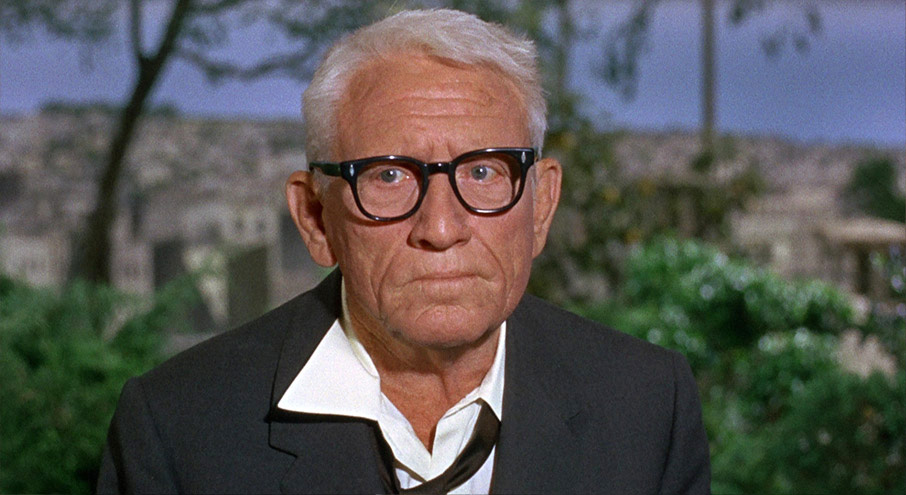
Most shocking is the opinion of the black housemaid, Tilly who's firmly (and happily from her point of view) wedged into her station in life and berates John with a double Dutch tilt from the camera that makes her scene even more threatening. That a lifetime of servitude and being second-class can be conceived as normal is bad enough, but the fact some people can wear those mantles with a ferocity in defence and likewise in anger at others trying to break the glass ceilings, beggars the mind. At the start of 2017 and where the world is right now, you may think the next remark is hopelessly naïve but I think we have proved we can move on as a society. John is all too aware of the shock that's waiting around the corner but he's not asking for special treatment. He's in love and love tends to ignore a great deal while uniting a couple. The cast is faultless with a little caveat regarding Katharine Houghton as Joey who is so winsome and trusting that she sees absolutely no problem with the effects her new beau may have on her parents, despite their liberal stance. Kramer directed her to emote this way, all innocent and wide eyed. And let's agree, for her first film, she has some pretty devastating competition.
Hollywood legend Spencer Tracy plays the wise old man Matt and his partner at the time (and full time nurse), another legend Katherine Hepburn plays Matt's wife Christina. Tracy was precariously ill at the time and died seventeen days after the film was wrapped. But in the movie, the feelings between these two giants of the screen are so authentic, you feel almost like you're spying on something intimate. Roy E. Glenn and Beah Richards play John's parents with the right degree of shocked incredulity and it makes me smile to know that Beah Richards play's Poitier's Mama in Guess and plays a character Poitier calls 'Mama' in In The Heat of the Night. Rounding off the main cast is Cecil Kelloway as Monsignor Mike Ryan, an old buddy of Matt's. He is delighted at the pairing and sees nothing but love in front of him. This was quite refreshing as I'm used to my cinematic priests being deluded idiots, specifically the one in Byron Haskin's War of the Worlds who expects God's love to protect him from a Martian heat ray! John is, of course, played by Sidney Poitier... Hepburn's own physical ailments are evident in the film as well as Tracy's frailty but never to the film's detriment.
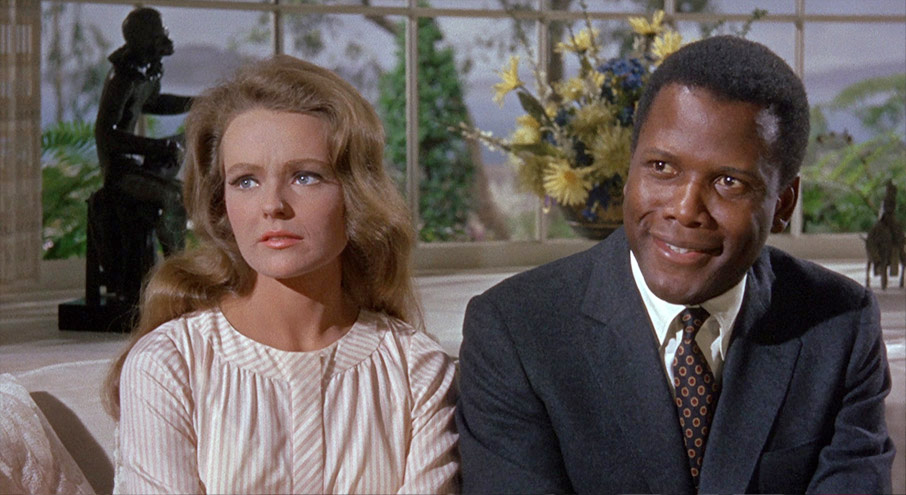
When critics made the point that Poitier tended to play saints, unblemished characters, experts in their field and morally so pure, not a single primal human thought would ever cross their mind, they must have had Dr. John Wayde Prentice Jnr. at the top of their lists. If John was anymore upstanding, it wouldn't be seemly and his credibility as a real honest-to-God human being would float off into cloud cuckoo land. I'm certain this next wording has been written about the character and the film many times but in order to present a black man in a white world and make him acceptable, he has to be whiter than white, the same way that our society expects women to be superb to compete with a man who is merely satisfactory. I heard somewhere (in one of the Extras) that "...if the family had a phone call during the movie saying Dr. Prentice had just secured his first Nobel, it wouldn't have seemed at all unusual." He can't fly but he is a super man. This is politically, a valid point - I just censored myself there. Instead of 'point' I'd written 'niggle', a perfectly good word but in this review... perhaps not). Apologies. Poitier is a smart guy and knows this argument but he had the long game to consider. Imagine the man playing a reprehensible character that could just reinforce dumb people's stereotypes. "He shot that guy 'coz he's black," would be, at that time, not an unreasonable thing to say if you were dumber than a bag of spanners. Things, mercifully, have changed. Poitier maintained the heroic to push minds to change, kept the pendulum at the noblest character end where it could do the most good. This does not expunge the necessary nuance vital to a well rounded and believable character. When Virgil Tibbs in In The Heat Of The Night sets his mind to getting the man who slapped him saying "I can pull that fat cat down and bring him right off this hill," Gillespie says (with the 'boy' being an innocent expression of surprise and not the racist epithet) "Oh boy, you're just like the rest of us..." It's a sublime moment in a great movie and allows Poitier to briefly step outside the heroic bubble a lot of his work necessitated. I just took a thirty minute break re-watching scenes from In The Heat Of The Night – just couldn't help myself. Boy, it's tough being a spokesman for millions of human beings but I can't imagine a better man for the job.
If I had to carp at anything, the film is dovetailed by the now, seemingly mawkish song, 'The Glory of Love' just in case we didn't get what the narrative was actually about and the oft mentioned scene in reviews of Hepburn and Tracy buying an ice cream (a really laboured metaphor on prejudice) doesn't fly as high for me as it did for many other critics. There are also shots where I swear there are no lenses in Tracy's glasses and that takes you out of the drama because it's such an obvious mistake... I guess they had too many problems with lighting reflections. See a note on the Image Gallery where the glasses definitely have glass in them. Guess Who's Coming To Dinner is classic mainstream Hollywood doing its bit for social justice. The fact the movie actually affected society at the time is a big plus in Stanley Kramer's heady list of achievements. Bravo.
Presented in the 1.85:1 ratio, the picture quality is edible with a tiny caveat. The stock used knocks on three strip Technicolor's door, as the colours are almost neon in intensity. Kramer is old school and technically the film is rock solid. But the fifty years have taken their toll. I saw tramlines (vertical lines caused by dust's movement as the celluloid passes through the gate), dust spots and stray hairs. They don't detract. In fact I didn't notice them on my first viewing.
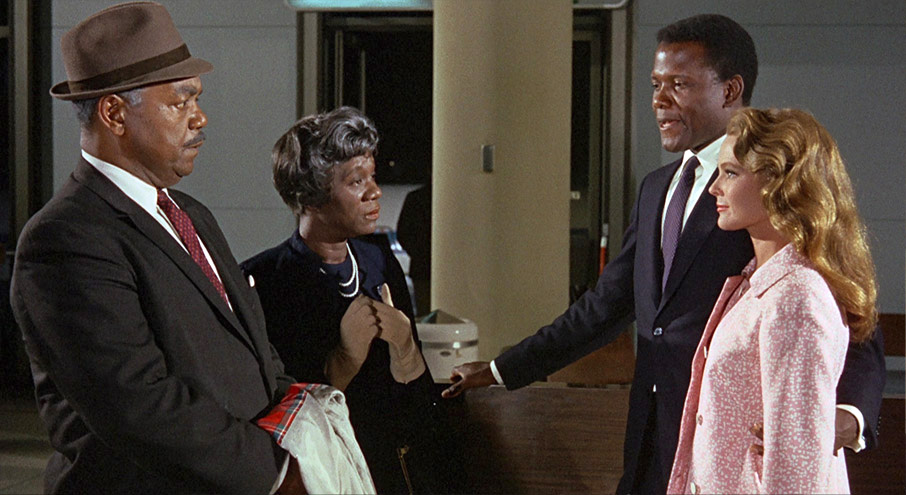
The nice surprise is the choice of soundtracks – mono or 5.1 surround. I was shocked by how amazingly clean the sound was on a fifty year old movie. The surround is pleasingly immersive but this is no action spectacular so the rears and the sub provide minimal extra clout. There are new and improved (one again assumes from the earlier DVD release) English subtitles for the deaf and hard-of-hearing.
Four Introductions:
Karen Kramer (2' 37"), Steven Spielberg (1' 12"), Tom Brokaw (2' 44") and Quincy Jones (2' 49")
Stanley Kramer's widow Karen introduces the movie with reference to his entire career. This is a very proud lady and so she should be. Steven Spielberg briefly steps in to announce that it is the movie's 40th anniversary. As he's a decade out, we can assume the DVD release came out in 2007 which dates a lot of the Extras. Spielberg adds that Kramer "...is one of my favourite filmmakers of all time." Tom Brokaw, a television journalist, tells a few nice stories about his relationship with Kramer's oeuvre and finally Quincy Jones looks back upon a year that changed the social face of America and salutes Kramer and his good intentions.
A Love Story for Today: production retrospective (29' 53")
Stanley Kramer introduces his film as just a love story between a man and a woman. Tick, VG. Nice to see Norman Jewison in the flesh (the director of In The Heat of the Night. Katharine Houghton sounds a lot of fun with a great Hepburn impression. The studio played the 'Spencer Tracy uninsurable card' which of course masked the real reason, an understandable nervousness over the subject matter. The studio's bluff was called (Hepburn covered the costs) so Columbia backed down. Katharine Houghton (and shame on me for suggesting her wistful naiveté gave away her inexperience) said of her part "A girl like Joey is a concept. She's not a real girl and it's very, very difficult to play an idea..." What an extraordinarily insightful quote. Lovely to hear from Louis Gossett Jnr. with some terrific ideas on race relations and generational differences. Salome Thomas El celebrates Cecil Kelloway's performance as the inclusive and loving Monsignor. As I said in my review, that man was the purest form of fresh air.
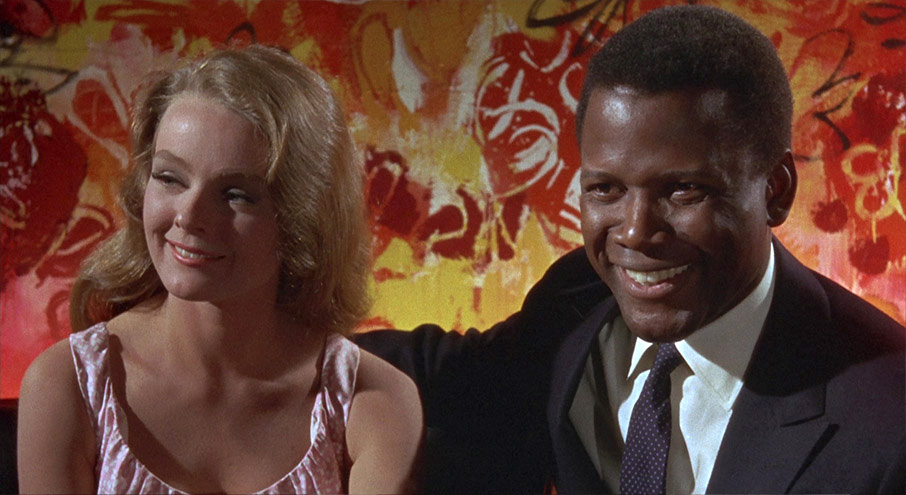
A Special Kind of Love: archival recordings of Hepburn, and an interview with
Hepburn's niece (17' 14")
"The woman is more liberal than the man." So says Katherine Hepburn at the start of this Extra. Katharine Houghton tells the story of her aunt criticising her... "Is that how you're going to play the scene?" Power to Houghton who replied "That is how Stanley directed me to play the scene..." Touché. This unintentionally revealed the power play between class actress (and aunt) Hepburn and director Stanley Kramer. Nice to see the editor, Robert C. Jones have a say in this retrospective. He acknowledged how he needed to keep the energy of Tracy's last speech up by relying on reaction shots. And it is one hell of a final speech.
Stanley Kramer: A Man's Search for Truth: an overview of Kramer's vision (16' 55")
Kramer in interview basically defining why he does what he does. The contributors are a real first class roster of talent; Dennis Hopper, Dick Van Dyke, Beau Bridges, Alec Baldwin and Taylor Hackford. I have to keep reminding myself this was a decade ago. Bridges says what's most relevant; "We need the spirit of Stanley Kramer more than ever." Amen to that.
Stanley Kramer Accepts the Irving Thalberg Award(1' 59")
Black and white, 4x3 TV coverage of 1961's Oscar Ceremony and Kramer accepting the Irving Thalberg Award with grace and humour (and a good grandmother gag).
2007 Producers Guild Stanley Kramer Award Presentation to An Inconvenient Truth (4' 35")
The PGA (Producers Guild of America) offers to the worthy recipient, the Stanley Kramer Award to movies that have dealt with social issues, events and arguments that define our social progress. Ten years ago, it went to Al Gore and his An Inconvenient Truth.
Original theatrical trailer (2' 37")
Using a graphic finger ringing a doorbell to wipe into each shot, the trailer is made up of each of the leads giving a meaty piece of dialogue and it works well for the most part. This movie's underlying premise is such that if you harbour racist ideas then no marketing is going to get you in to that cinema but for all those who enjoy drama with a bit of social commentary thrown in, then it works just fine.
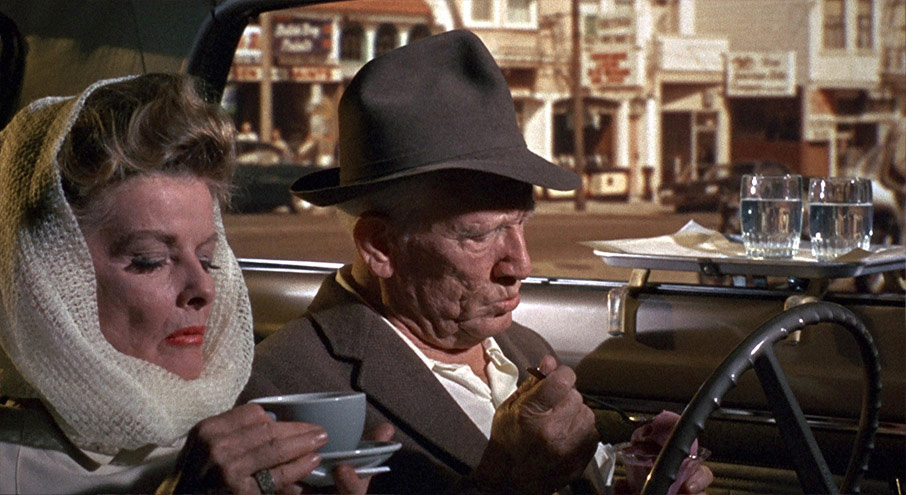
Teaser trailer (1' 04")
The title card reads 'A special announcement about a very special film'. Hmmm. This is Hollywood at its most self-congratulatory, heaping significance on the film because it has a 'difficult' subject. I don't blame the marketing department at the time. With a few choice lines from each of the principals, this is essentially a cut down of the main trailer.
Isolated score track
Have fun with that...
Image Gallery
This features seventy-seven different publicity and behind the scenes stills, sometimes two per screen. There are a handful of FOH colour stills (front of house which you saw with the poster outside cinemas of old) and a poster but it seems that unlike my earlier comment, there is glass in Tracy's glasses in the behind the scenes shots. I'm slightly doubting my own sanity now. It must have been a reflection problem.
Booklet with new and archival contents
Like the one in To Sir, With Love, the booklet has cast and credits and another excellent essay on the movie 'Breaking New Ground' by BFI Chair, activist and filmmaker, Tega Okiti once more. Joining this is Jeff Billington's essay 'The Sidney Poitier Phenomenon'. Billington covers the political ground, the groundswell of barbs aimed at Poitier for playing the Hollywood white man's game. It's one of the very few political arguments where I can see the merit to both sides. How does a race or a culture peacefully merge with another accepting that historically the relationship was master and slave? Do blacks make concessions to their ethnicity to play the white parts (do races have stereotypical character traits? Some would like to make us believe so...) or do brave black and white establishment filmmakers try to embrace what it means to be black at that time in history? I'm no academic but would venture that the best merging comes from both sides stepping out of their comfort zones.
Guess Who's Coming To Dinner is a classic Hollywood movie about what used to be regarded as an awkward subject done with wit, grace and classic directorial style. Director Stanley Kramer, whose oeuvre is eclectic but always socially progressive, delivers a lot to think about wrapped up in a light, airy dramatic confection. Warmly recommended.
*http://www.indiewire.com/2014/02/the-art-of-lighting-dark-skin-for-film-and-hd-162072/
|